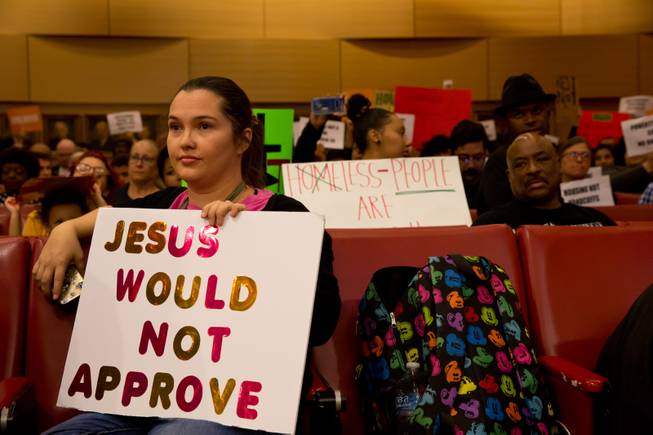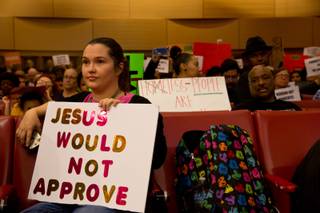
Members of the community have gathered at Las Vegas City Hall during a city council meeting to show their disapproval for a city ordinance being considered that will criminalize sleeping and resting in public areas downtown and surrounding areas Wed. Nov. 6, 2019.
Wednesday, Dec. 18, 2019 | 4:11 p.m.
The Supreme Court’s decision not to review a lower court ruling that declared an Idaho anti-camping ordinance unconstitutional will not impact a similar ordinance in Las Vegas, City Manager Scott Adams said Wednesday.
The 9th U.S. Circuit Court of Appeals ruled in 2018 that the city of Boise cannot ban sleeping and camping in public spaces without providing the homeless with adequate shelters or other places to sleep. Boise appealed the decision to the Supreme Court, but the high court declined to take up the case Monday.
Similar to some other Western cities, Las Vegas passed an ordinance in November banning sleeping and camping, punishable by a fine of up to $1,000 or imprisonment for up to six months. The ordinance makes it a misdemeanor to sleep, camp, lie down or sit in virtually all downtown areas and aims to shuffle the homeless into shelters, the Las Vegas Courtyard Homeless Resource Center and other resources.
It differs from Boise’s law because the measure in Las Vegas will only be enforced when there are beds available at shelters or at the homeless courtyard, Adams said. The Las Vegas law thereby “accommodates the concerns” raised by the 9th Circuit, which covers Western states including Nevada, he said.
“One notable consideration is the fact that as we move forward with the encampment ordinance, we can suspend enforcement should there not be sufficient shelter capacity at the time,” Adams said.
But Eric Tars, legal director of the National Law Center on Homelessness and Poverty, said it’s not clear whether Las Vegas’ ordinance could face legal challenges like the one in Boise did. Las Vegas’ ordinance shares with the Boise law some of the same problems identified by the 9th Circuit. It, too, was purportedly only enforced when shelters self-reported that they had available beds, Tars said.
The problem is that shelters could be run by religious organizations that impose faith-based principles on those who stay there, or could lack accessible services for people with disabilities, according to Tars. Shelters also typically require people to arrive at a certain time to secure a bed, which is challenging for homeless people who work night shifts.
“Many people experiencing homelessness are probably working at low-wage jobs in the casinos and other entertainment facilities, where they may work night jobs. So they have to sleep during the day,” Tars said. “Probably these facilities aren’t available for sleeping during the day.”
The 9th Circuit ruling also specifies that Boise must provide sheltered beds for the homeless, not outdoor mats as are available at the Las Vegas homeless courtyard, in order to constitutionally enforce any type of camping ban, Tars added. This could create legal and enforcement challenges for Las Vegas as well.
“The 9th circuit in Martin v. Boise at least appeared to distinguish that indoor beds are what they’d be looking at,” he said.
Las Vegas’ ordinance will be enforced in all areas near residential properties, in 12 downtown-area districts, and within 500 feet of food processing facilities at all hours when shelters have space. The city is also considering another bill that would expand the prohibitions to apply during hours when maintenance officials are cleaning public sidewalks.
The goal of these measures is to help the thousands of homeless people who reside in Las Vegas get off the streets and connect to resources, said Mayor Carolyn Goodman, who sponsored both bills. Encampments also pose health and public safety hazards, city officials say. Critics have described the measures as inhumane for the homeless, who could have valid reasons for not staying in a shelter, and impractical given that local shelters routinely reach capacity.
While the original Las Vegas ordinance passed the city council 5-2 on Nov. 5 and is technically in effect, the city will not begin ticketing, fining and jailing violators until Feb. 1. The news out of the Supreme Court will not change the timeline of the ordinance, Adams said.
“It’ll be business as usual going forward under the timeline we previously implemented,” he said.
The city council will vote on the second proposed ordinance outlawing the same activities during designated cleaning hours on Jan. 15.

